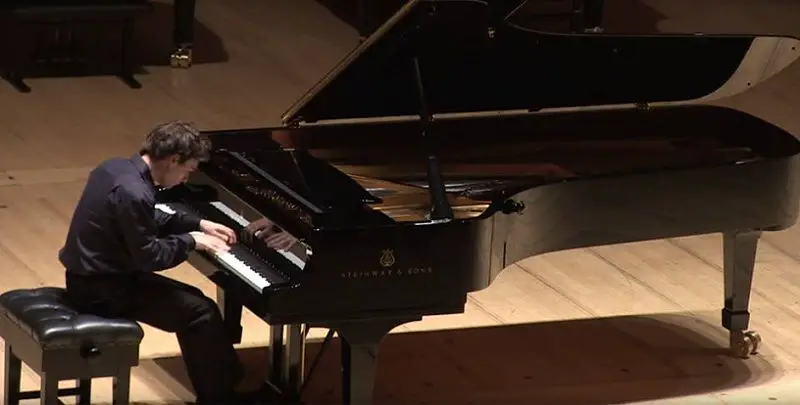
Top piano competitions in the World. These competitions are a great opportunity for the young musicians to get noticed, and also allows music lovers to hear some fantastic piano performances from future stars.
Frederic Chopin International Piano Competition
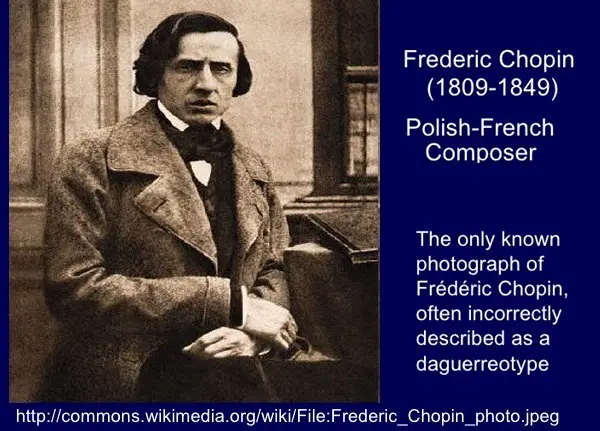
The Chopin Piano Competition is one of the oldest and the most prestigious piano competitions in the world. It is a month-long celebration of Poland’s best-known composer.
The first piano competition was held in 1927. Held in Warsaw every 5 years. The competition has produced superstar pianists such as Marta Argerich, Krystian Zimerman and Maurizio Pollini.
Tchaikovsky International Music Competition (in Moscow)
Held every four years in Moscow, this is also among the most prestigious competitions for instrumentalists (piano, violin, violin, viola and cello) in the world.Van Cliburn International piano competition
Hosted by the Van Cliburn Foundation, the Van Cliburn International Piano Competition is another prestigious competition that is held in various cities in the United states.
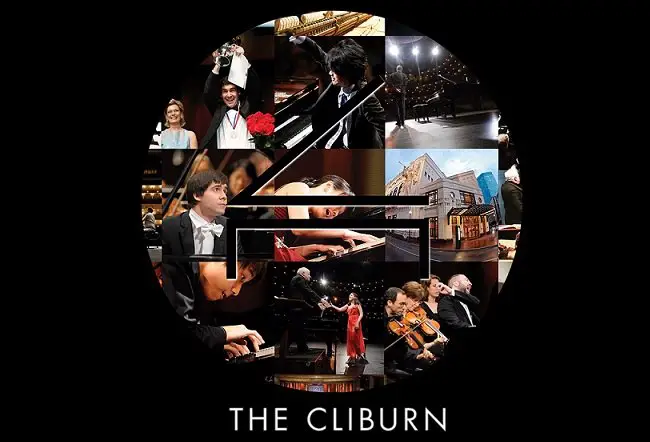
It all started in Moscow, in 1958, at the height of the cold war. The Soviet Union wanted to showcase its cultural superiority by mounting the Tchaikovsky International Piano Competition. Naturally, a Russian was expected to win.
However, a young Texan named Van Cliburn not only performed spectacularly but won the competition after wowing the jury as well as audience.
People in the US decided to honor Van Cliburn by setting up a competition that will rival the one in Moscow.
The Van Cliburn International piano competition is a major American cultural event held every four years. It brings together the world’s best pianists to Fort Worth, TX to compete for the coveted Cliburn gold medal.
Website: cliburn.org
Queen Elisabeth International Music Competition
In honor of Elisabeth of Belgium (Gabriela Elizabeth of Bavaria), this prestigious competition has different categories including piano, violin, composition, singing. The competition is held in Brussels.
Ferruccio Busoni International Piano Competition
Held in honour of composer Ferruccio Busoni, the Busoni International Piano Competition is usually organized every year in the Italian Tyrol.Anyone who loves music should attend, whether they are professional or amateur pianists, music teachers, students, or those who don’t play but just like to listen.
The audience can enjoy a huge variety of music from diverse genres including baroque, classical, romantic, impressionist, modern, etc.
Listeners enjoy music from the very familiar to works they’ve never before heard. Some find it interesting to hear the same piece performed by several competitors, showcasing their very distinctive styles of playing.
More Piano Competitions
China International Music Competition
The First China International Music Competition held in Beijing (presented by the China Conservatory of Music) offered first prize of $150,000 plus professional career management for three years (second and third prizes are $75,000 and $30,000).
For the inaugural competition, the Philadelphia Orchestra played the competition’s last round, when the finalists performed concertos. Acclaimed music director Yannick Nezet-Seguin was the conductor.
Experts say that China wants to be placed on the international music map in a very serious way and wants this competition to be as important as the Cliburn or Tchaikovsky or Queen Elisabeth.
China has a huge pool of talented young musicians who are into classical music from a very young age. China has a massive population of piano students (an estimated 20 million to 40 million). The technical proficiency at the age of 12 in China is astounding; there are so many children who can play anything. However, their motivation is success and fame, and not necessarily the love of music, which even the (conservatory) president is aware of and he’s very keen to change that.
A music competition of the highest musical standards could provide a solution, and could also prevent gifted young Chinese musicians to migrate to the West to further their studies.
Also Read: Music competitions produce winners who don’t go on to become major artists
Hastings International Piano Competition
More aspiring young pianists are applying to take part in the Hastings International Piano Concerto Competition – a clear sign the event is now a recognized player on the international competition circuit. In the past, winners of this competition have went on to win top honors at prestigious piano competition such as the Van Cliburn International Piano Competition.
Live auditions are held in various cities in countries such as China, Japan, Italy, UK and USA, and the standards are extraordinarily high. with a wide variety of talent including pianistic expertise, showmanship, sensitivity and passion. The final contestants travel to Hastings to play live in front of an international jury.
Website: hastingsinternationalpiano.org
Leeds International piano competition
The Leeds International Piano Competition (known as “The Leeds”) is an international keyboard circuit and is going global in an effort to compete with the top piano competitions.
Not all the rounds happen in Leeds, England nowadays. In one of the years, the first round happened in Berlin, then Singapore, then to New York, and finally to Leeds.
In terms of performances, the Leeds piano competition makes more demands than before. The rules now require performers to offer more repertoire, with more variety. They have to prove themselves in chamber music, collaborating with other instrumentalists. For the finals they must offer two concertos, with one from before the Romantic era — which means they cannot rely on churning out the standard virtuoso repertoire of Rachmaninoff, Tchaikovsky and Grieg that often wins competitions. Most interesting of all, performers have to put together a recital program with a written explanation of the thinking behind it.
Dranoff International 2 Piano Competition
The Miami-based Dranoff International 2 Piano Foundation was established in 1987 by the late pianist and educator Loretta Dranoff, in memory of her husband and performance partner, Murray Dranoff.
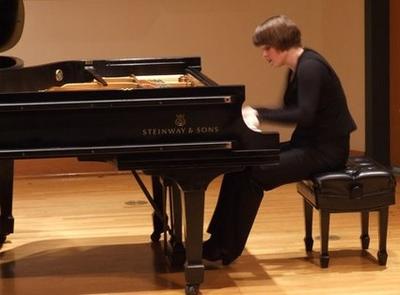
For the Dranoff International 2 Piano Competition, two piano artist teams have to prepare four hours of repertoire, spanning across four rounds of competition, over a period of one week.
The Dranoff International 2 Piano Foundation is generously sponsored by the Department of Cultural Affairs, Miami-Dade County, Steinway and Sons, Bacardi USA, Lufthansa, and The Betsy South.
Right from the initial application to the finals, the cycle spans around 18 months.
Applicants initially have to submit a 45-minute, unedited DVD of an original audition performance. the winners then go on to the Regional Live Audition Rounds, which take place in a music and cultural capital of the Americas, Europe and Asia.
Finally, the contestants are selected to travel to Miami for the Semi-Final and Final Rounds.
The competition features top scholars and piano performers as judges.
- The top prize fetches a gold medal and $25,000.
- The runners-up receives a silver medal and $15,000 second prize.
- The one finishing third takes home $10,000.
In the past, the competition attracted Jurors from Hannover Musikhochschule, University of Southern California, Shanghai Conservatory of Music, De Singel Music Complex (Antwerp), Lincoln Center, Boston Symphony Orchestra.
Scottish International Piano Competition
The Scottish International Piano competition has enabled several talented young musicians to gain recognition in their professional careers. The competition starts with the preliminary rounds, then the semi-finals at the Glasgow’s Royal Conservatoire of Scotland, and the concerto final at the Glasgow Royal Concert Hall.
Website: www.scottishinternationalpianocompetition.com.
Competitors, aged 18-30 from various countries take part in a series of recital programmes, and a concerto final before an international jury of musicians and pianists. Each pianist presents two, 30 minute recitals, before the ten semi-finalists are selected.
Each round of the Competition is played on a different piano: a Bosendorfer, a Fazioli and a Steinway, each generously provided by the manufacturer, in order to create a variety of experience for the competitors and the audience.
“It’s the audience that really makes or breaks it. It’s an extremely collaborative experience. Live performance, the communication between performer and audience – those are the essence of the competition,” says Aaron Shorr, chair of the Scottish International Piano Competition jury (and also head of keyboard at Glasgow’s Royal Scottish Conservatoire).
Useful Links:
Bosendorfer USASU International Piano Competition
Music instrument and equipment manufacturer Yamaha also organizes several piano competitions.
Established in 2006, the Bösendorfer and Yamaha USASU International Piano Competition is held biennially at Arizona State University’s Herberger Institute for Design and the Arts.
Participants (ages 19–32) have to advance through three stages of competition before reaching the final round.
Watch: Xuesha Hu; 8th Bösendorfer USASU International Piano Competition Semi Finals
Yamaha competition for Jamie Cullum’s £60,000 piano
Yamaha and jazz artist Jamie Cullum teamed up to give participants the chance to win a Yamaha S6 grand piano.
Entrants had to write and record an original song that demonstrated how the S6 grand could inspire more music-making and creativity in their community. All entries were judged on melody, composition, originality, and lyrics.
Jamie Cullum comments: ‘If you are a charity, community group or a school, you could win this very piano; this Yamaha S6 grand, that has been living for the last few years in my studio. I’ve written loads of songs on it, I’ve recorded albums on it. It’s coming out with me one last time on my 2020 Taller tour, and then… it could be yours!’
Yamaha’s Piano Product Specialist, Phil Power says: ‘Through this initiative, we hope that Jamie’s piano will inspire music-making and creativity within communities. Our ambition is for the piano to make a real difference to the winning organization, its community and all those who will have access to it.’
Read more at
Boston International Piano Competition (BIPC)
Boston International Piano Competition (BIPC) is organized by Boston Piano Amateurs Association, based in Northborough, and is aimed at highly talented amateur pianists. Performances and awards ceremonies are free and open to the public.
The competition draws amateur performing artists who are passionate about playing the piano and who love music. Though the pianists are not playing as their first career, they enjoy this rich facet of their lifestyle musically and socially. They each experience triumphs and disappointments as they build their competition resume, challenging themselves to give their best performances possible.
The competition is divided into gold and silver “streams.” Each stream features two to three rounds, judged by a jury panel of celebrity concert pianists and educators. Special prizes are awarded for the best performances of romantic, classical, baroque, and modern piano pieces, as well as an audience prize, selected by audience ballot. The competition will also webcast live to the worldwide audience via the nonprofit organization’s website.
The audiences are a great incentive for competitive pianists to intensely prepare for their recital programs, study with exceptional teachers, and play to the best of their ability to share their love of music. The contestant’s performances are enjoyed by those present in person, as well as a worldwide audience via a live webcast throughout the competition. These performing artists also serve as students for many of the excellent Boston area piano teachers.
Boston International Piano Competition
Website: bostonpianoamateurs.orgAlso Read: Top Jazz International Piano Competitions.
Music Festivals
Gilmore Keyboard Festival (Kalamazoo, Michigan)
Gilmore Keyboard Festival is internationally recognized as one of the most prestigious piano music festivals in America. The festival attracts high caliber musicians and a variety of talent to Southwest Michigan.
Close to fifty world class talents perform over 100 times in various venues around the region, but most of the performances are centered in Kalamazoo.
The music ranges from solo artists to orchestra concerts, from jazz to classical and even one theatrical piece.
Besides top notch performances, the festival also hosts several workshops, and presents several educational opportunities.
Website: thegilmore.org
Piano Island Festival
Local Singaporean musician Wang Congyu brings internationally acclaimed musicians to Singapore for masterclasses to develop young talent.
Pianist Wang Congyu, 26, and his French wife Julie Lu, 28, have put $80,000 of their savings into the Piano Island Festival. Wang was inspired to start the festival after he realised how costly it was to travel frequently to Europe for concerts and classes. He is now determined to bring internationally acclaimed musicians to Singapore to impart their wisdom to youngsters.
“Singapore has a lot of potential and music talent, but young upcoming musicians don’t get many chances to learn from overseas masters and make contacts. I want to build a platform for more young musicians to perform overseas.
I hope we can find the next Lang Lang in Singapore,” says Wang Congyu.Young pianists can take part in competition, win cash prizes and scholarships for overseas music courses, and the chance to give recitals abroad. The competition is split into three age categories of 10 and under, under-18 and above-18 The grand prize for the above-18 category includes one week of masterclasses in Normandy, France, with acclaimed French pianist Jean-Paul Sevilla.
INFO: pianoislandfestival.com
Art of the Piano festival, CincinnatiArt of the Piano is an intimate festival created and led by pianist Awadagin Pratt. It’s a platform for learning from the world’s leading artists and teachers, to perfect recital and competition repertoire, and to have a quiet, beautiful place to practice and learn.
The annual Art of the Piano festival is held at the University of Cincinnati College-Conservatory of Music.
Students will be performing recitals as well as in master classes conducted by artist faculty members. They, and the public, will be able to hear lectures on related topics, such as “how to make a living as a performer”. There also will be roundtable lunches and question and answer sessions, where students can interact with the faculty.
Pratt is already pondering the idea of adding a competition to his festival, perhaps to fill the void of the annual Cincinnati piano event (which shut down after 60 years). For the most up-to-date schedule of the various concert programs, visit artofthepiano.org.
High Pressure Piano Competitions seen with suspicion by serious artists
High-pressure piano competitions are being seen with suspicion by serious artists around the world.
Glenn Gould said that piano competitions left their “eager, ill-advised supplicants forever stunted, victims of a spiritual lobotomy.”
Maybe yes. But one thing seems to be sure: Piano competitions don’t work, and here’s why.
Heard of Van Cliburn?
When he won Russia’s International Tchaikovsky Competition in 1958, Cliburn became a world-wide celebrity overnight…and many feel ‘that’ was the problem.
This is an example that is often cited whenever the pitfalls of piano competitions are spoken of, and how it can make a crucial difference to the lives of gifted artists (in a bad way).
Mr. Cliburn retired from the concert stage two decades later, burned out at the unripe age of 43; experts blame it on the fact that he became a superstar overnight.
Besides, very few winners went on to have indisputably major solo careers.
Van Cliburn International Piano Competition in Fort Worth, Texas, launched in 1962 in honor of the Texas-born pianist, has several gold medalists who fail to make it big.
So why do music competitions produce winners who don’t go on to become major artists?
Its because the winners are chosen by juries, who are unable to agree on great artists.
Their disagreement inevitably leads to compromise, which more often than not produces average winners, who are good enough to please all the jurors, but not skillful enough to thrill any of them.
In recent years, Boris Giltburg, an Israeli pianist who won Belgium’s Queen Elisabeth Music Competition, had mixed feelings about his victory. “I’m a bit angry at the world for not having come up with another way of discovering talent other than competitions.” He also said he would never serve on a jury for a classical-music competition.
Mr. Giltburg’s comment attracted widespread attention because he was the winner of the world’s most prestigious musical competitions.
A few decades back winning artists would become popular throughout the music world. They would get exclusive recording contracts and were booked by symphony orchestras. Sometimes they even made it onto television. (Mr. Cliburn appeared on “The Ed Sullivan Show” and “The Tonight Show.”)
However, none of that is true now.
Today, more and more are now self-marketing themselves using internet technologies as iTunes, YouTube and podcasting.
Despite that, organizers still bother to hold music competitions, despite knowing that the road to success for classical musicians is no longer well defined (now).
Full story on WSJ. Read more here.
Classical Pianist & conductor Mitsuko Uchida says young pianists are constantly pushed under lot of pressure to be a star instantly. Japanese born Uchida says it takes a lifetime to understand music.
Uchida also insists that piano players need to develop their unique style. “You have to have your own sound. Think of the pianist Rudolph Serkin. He could play on the worst upright with strings missing, and within a few bars you would know it was him.” says Uchida.
Related Posts:
KeytarHQ editorial team includes musicians who write and review products for pianists, keyboardists, guitarists & other musicians. KeytarHQ is the best online resource for information on keyboards, pianos, synths, keytars, guitars and music gear for musicians of all abilities, ages and interests.

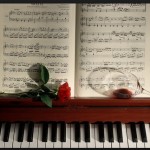


Leave a Reply